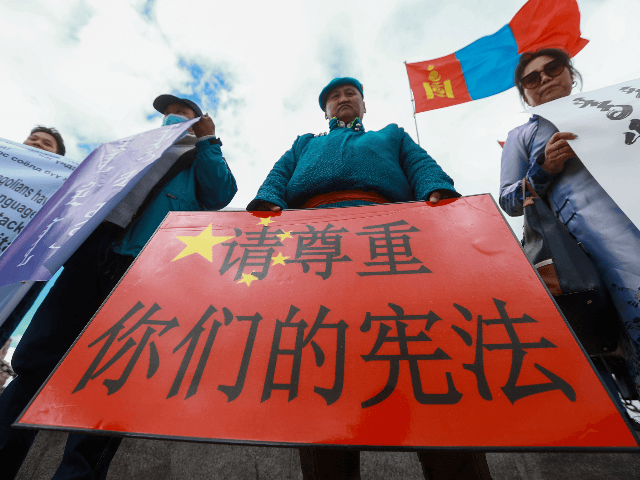Protests against the Chinese Communist Party (CCP) over its bilingual education plan — allegedly an effort to eradicate the Mongolian language in China — continued on Tuesday after weeks of tension and intense political scrutiny that saw the arrests of more than 5,000 Mongolians.
Ethnic Mongolians launched protests against the Chinese regime in Inner Mongolia, a Chinese province, that crossed the border into the nation of Mongolia this week.
Mongolians gathered in the capital of Ulaanbaatar on Tuesday to protest the visit of top Chinese diplomat Wang Yi, which comes as the People’s Republic of China (PRC) continues to suppress their native language within its borders and stifles opposition by ethnic Mongolians in China to the policy, Reuters reported.
Approximately 100 demonstrators assembled in Sukhbaatar Square, outside of the Government Palace, and reportedly chanted “Wang Yi go away” and “let’s protect our native language.”
The demonstrations come in response to the PRC’s implementation of a “bilingual education” policy in the border region of Inner Mongolia, which boasts a sizable ethnic Mongolian minority. Under the plan, the region’s schools will introduce Mandarin in the first grade, one year earlier, and reserve literature, politics, and history for exclusively Mandarin instruction, according to the Times of India. Ethnic Mongolians make up about 20 percent of the Inner Mongolian population.
The Chinese regime has organized a large-scale crackdown on opposition to the bilingual education plan. Police have arrested at least 5,000, students, parents, and activists alike, Bitter Winter reported. Moreover, social media platforms like WeChat face intense CCP scrutiny, with the authorities aggressively monitoring any efforts to organize dissent.
After officials announced the plan in late August, ethnic Mongolians staged a mass protest and boycott of the school through keeping children from attending. At the height of resistance, nearly 300,000 students were absent from school across the region, according to an estimate from the Southern Mongolian Human Rights Information Center (SMHRIC).
In addition to the absences, the region saw mass resignations of Chinese Communist Party (CCP) officials and even one defiant suicide.
Locals fear the move is one toward enforcing cultural unity within China and aims to eradicate the Mongolian language and, consequentially, the Mongolian identity itself.
Communist officials have repeatedly denied that the plan seeks to eliminate the Mongolian language. Foreign Ministry spokesperson Hua Chunying asserted the necessity of the move, stressing the need for communication within China and asserting that Chinese law protects Mongolians’ right to use their native language.
Fears in the Mongolian community stem in part from China’s treatment of other ethnic minorities. In 2017, the Chinese government completely banned the use of the Uyghur language in Xinjiang at all levels of education, according to Radio Free Asia. China imposed a “bilingual education” program similar to that of Mongolia in Tibet, as well, having Mandarin largely supersede the local language in all school programs, CNN reported.
The government of the nation of Mongolia has not commented on the issue, prompting dissent from its citizens with sympathies toward their linguistic brethren across the border.
“Our leaders need to speak up,” a protester in Mongolia, identified as Khaliun Sukhbaatar, told Reuters, adding that “if our government keeps silent in the name of international relations and economic stability, one by one Mongolians are being pressed out and Mongolia will cease to exist.”
Mongolia and China maintain close economic ties. China is Mongolia’s primary export market. Wang will reportedly provide a large economic grant from China to Mongolia during his visit.
Han people have taken over ethnic Mongolians to comprise the majority in Inner Mongolia. The region has been part of a unified Chinese state since the foundation of the Qin Dynasty in the third century B.C.

COMMENTS
Please let us know if you're having issues with commenting.